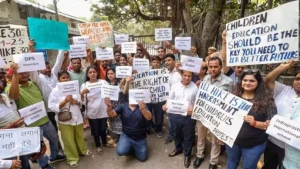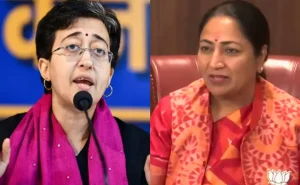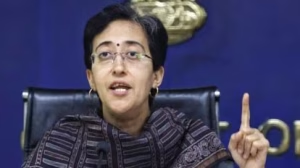New Delhi – In a strong rebuke to the recently approved draft legislation, Delhi Opposition Leader Atishi questions Delhi Fee Regulation Bill by BJP, describing the entire process as “completely non-transparent.” The criticism comes just one day after Delhi Chief Minister Rekha Gupta announced the Cabinet’s approval for the draft Delhi School Education (Transparency in Fixation and Regulation of Fees) Bill, 2025.
The draft bill, which aims to regulate fee increases in private schools across the national capital, was introduced following weeks of protests by parents against what they describe as arbitrary fee hikes implemented by numerous Delhi-based private schools over the past two months.
In her letter to the Chief Minister, Atishi highlighted the irony of the situation: “It is ironic that while the bill seeks to establish a ‘transparent procedure’, the whole process till now has been completely non-transparent.” This contradiction forms the central critique as Atishi questions Delhi Fee Regulation Bill by BJP administration.
Also Read: Big L-G vs Govt. Tussle Ends in Delhi After 7 Years of Legal & Political Rivalry
Parents’ Protests Ignored as Atishi Questions Delhi Fee Regulation Bill By BJP

The controversy began when thousands of parents across Delhi started reporting substantial increases in their children’s school fees shortly after the BJP formed the government in Delhi. This timing has not gone unnoticed by the Opposition, with the Aam Aadmi Party (AAP) accusing the ruling BJP of forming a nexus with private educational institutions.
“This unprecedented situation put thousands of children and their parents in extremely distressing situations,” Atishi wrote in her communication to CM Gupta. “Students were debarred from classes if they did not pay the hiked fees, parents were seen protesting in extreme heat outside private schools and even went to the Hon’ble High Court.”
As Atishi questions Delhi Fee Regulation Bill by BJP government, she emphasizes that parents have been left with no recourse but to either pay the increased fees or face the possibility of their children being excluded from educational activities.
Critical Gap: Bill Fails to Address Current Academic Year
A major point of contention as Atishi questions Delhi Fee Regulation Bill by BJP is the bill’s timeline. According to available information, the proposed legislation aims to regulate fee increases starting from the academic year 2026-27, leaving the current academic year’s fee hikes unaddressed.


“It leaves the MOST important question unanswered: what happens to the fees already hiked by private schools this year? What will happen to all the parents who are facing these problems in the current academic year, 2025–26? Will they be forced to pay the arbitrary fees and charges introduced by schools in April 2025?” Atishi demanded in her letter.
This gap in addressing immediate concerns forms a central argument as Atishi questions Delhi Fee Regulation Bill by BJP, suggesting that the legislation may be more about appearances than substantive action.
No Public Consultation: Transparency Questions Mount
Further strengthening her case as Atishi questions Delhi Fee Regulation Bill by BJP is the apparent lack of public consultation in drafting the legislation. In her letter, she pointed out that the Delhi government had not shared details of any consultative process nor released the draft Bill for public scrutiny.
“Till now, we only know what is being reported in the media, we have no authentic document to refer and comment upon,” she stated, highlighting the contradiction between the bill’s stated aim of transparency and the opaque manner of its development.
The Opposition has not been provided with the full text of the draft bill, further complicating efforts to provide meaningful feedback or critique of the proposed measures. As Atishi questions Delhi Fee Regulation Bill by BJP leadership, she emphasizes that democratic governance requires openness and consultation with all stakeholders.
“Eye-Wash” Legislation: Atishi Questions Delhi Fee Regulation Bill By BJP’s Real Impact

Perhaps the most damning criticism as Atishi questions Delhi Fee Regulation Bill by BJP comes in her characterization of the legislation as merely an “eye-wash” if it fails to address the current academic year’s fee hikes.
“In the absence of controlling the excessive and unreasonable fee hike in the current academic year, passing a new law for the coming years would seem merely an eye-wash,” Atishi stated, suggesting that the bill may be designed more for political appearances than to provide immediate relief to affected families.
This accusation gains weight from the timing of the bill’s introduction, which comes after weeks of protests that have placed significant political pressure on the new BJP government in Delhi. As Atishi questions Delhi Fee Regulation Bill by BJP, she implies that the legislation may be an attempt to defuse criticism without taking meaningful action.
Concrete Demands as Atishi Questions Delhi Fee Regulation Bill By BJP
Not content with merely raising criticisms, Atishi has presented concrete demands as she questions Delhi Fee Regulation Bill by BJP government. These include:
- An immediate order to halt all fee hikes and new charges introduced by private schools for the current academic year (2025-26)
- A directive mandating schools to refund any already collected increased fees
- A freeze on any further fee increases until the new law is implemented
- Publication of the draft Bill for public feedback before its presentation in the Delhi Assembly
These demands represent specific actions that could address the immediate concerns of parents while the longer-term regulatory framework is developed. As Atishi questions Delhi Fee Regulation Bill by BJP administration, she emphasizes that meaningful action requires addressing both immediate needs and long-term policy.
Parents’ Plight Central as Atishi Questions Delhi Fee Regulation Bill By BJP
Throughout her critique as Atishi questions Delhi Fee Regulation Bill by BJP, the Opposition leader has maintained focus on the practical impact on families across Delhi. Reports indicate that many parents have faced difficult choices, with some even considering removing their children from private schools due to the financial burden of increased fees.
The situation has been particularly challenging as these fee hikes came with little warning, leaving families with insufficient time to adjust their budgets or explore alternative educational options. As Atishi questions Delhi Fee Regulation Bill by BJP government, she highlights the real-world consequences of policy decisions on everyday citizens.
Political Implications as Atishi Questions Delhi Fee Regulation Bill By BJP
The controversy emerges at a politically sensitive time, with the BJP having recently formed the government in Delhi. As Atishi questions Delhi Fee Regulation Bill by BJP, there are clear political dimensions to the debate, with AAP seeking to position itself as the defender of middle-class families against what they characterize as corporate-friendly policies.
This dynamic adds complexity to the situation, as both parties seek to claim the mantle of educational reform while accusing the other of failing to address the needs of Delhi’s families. As Atishi questions Delhi Fee Regulation Bill by BJP, the political stakes extend beyond education policy to questions of governance philosophy and priorities.
Looking Forward as Atishi Questions Delhi Fee Regulation Bill By BJP
The coming weeks will likely see continued debate as Atishi questions Delhi Fee Regulation Bill by BJP and calls for public consultation on the draft legislation. The government’s response to these criticisms will be closely watched by parents, educational institutions, and political observers alike.
What remains clear is that the issue of school fee regulation touches on fundamental concerns about affordability, access to quality education, and the proper role of government in regulating private educational institutions. As Atishi questions Delhi Fee Regulation Bill by BJP, these broader questions will continue to shape Delhi’s educational landscape for years to come.

